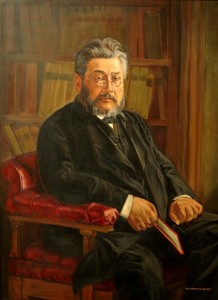 “We are often told (I mean those of us who are commonly nicknamed by the title of Calvinists—and we are not very much ashamed of that; we think that Calvin, after all, knew more about the Gospel than almost any man who has ever lived, uninspired), we are often told that we limit the atonement of Christ, because we say that Christ has not made a satisfaction for all men, or all men would be saved. Now, our reply to this is, that, on the other hand, our opponents limit it: we do not.
“We are often told (I mean those of us who are commonly nicknamed by the title of Calvinists—and we are not very much ashamed of that; we think that Calvin, after all, knew more about the Gospel than almost any man who has ever lived, uninspired), we are often told that we limit the atonement of Christ, because we say that Christ has not made a satisfaction for all men, or all men would be saved. Now, our reply to this is, that, on the other hand, our opponents limit it: we do not.
The Arminians say, Christ died for all men. Ask them what they mean by it. Did Christ die so as to secure the salvation of all men?
They say, “No, certainly not.” We ask them the next question—Did Christ die so as to secure the salvation of any man in particular?
They answer “No.” They are obliged to admit this, if they are consistent. They say, “No; Christ has died that any man may be saved if”—and then follow certain conditions of salvation.
We say, then, we will go back to the old statement—Christ did not die so as beyond a doubt to secure the salvation of anybody, did He?
You must say “No;” you are obliged to say so, for you believe that even after a man has been pardoned, he may yet fall from grace, and perish. Now, who is it that limits the death of Christ? Why, you. You say that Christ did not die so as to infallibly secure the salvation of anybody.
We beg your pardon, when you say we limit Christ’s death; we say, “No, my dear sir, it is you that do it.” We say Christ so died that He infallibly secured the salvation of a multitude that no man can number, who through Christ’s death not only may be saved but are saved, must be saved, and cannot by any possibility run the hazard of being anything but saved. You are welcome to your atonement; you may keep it. We will never renounce ours for the sake of it.
 Now, beloved, when you hear any one laughing or jeering at a limited atonement, you may tell him this.
Now, beloved, when you hear any one laughing or jeering at a limited atonement, you may tell him this.
General atonement is like a great wide bridge with only half an arch; it does not go across the stream: it only professes to go half way; it does not secure the salvation of anybody.
Now, I had rather put my foot upon a bridge as narrow as Hungerford, which went all the way across, than on a bridge that was as wide as the world, if it did not go all the way across the stream.”
– C. H. Spurgeon
